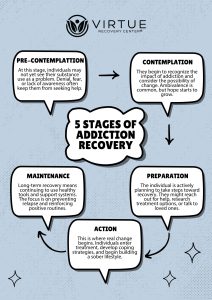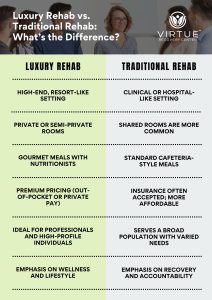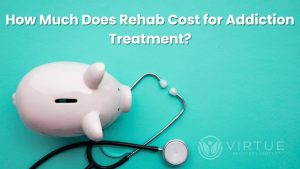Fentanyl is a synthetic opioid that is used medically to treat severe pain, such as that experienced by cancer patients. When used appropriately and under the supervision of a healthcare professional, fentanyl can be an effective pain-relieving medication. However, when used without a prescription or abused recreationally, fentanyl can carry serious risks.
Is fentanyl dangerous? How dangerous is fentanyl? Understanding the dangers of fentanyl can help you or a loved one stay safe and get on the road to recovery.
With the right treatment and support, individuals can overcome their addiction to fentanyl and regain control of their lives. If you or someone you know is struggling with fentanyl addiction, reach out for help today. Contact Virtue Recovery Las Vegas – Substance Use Disorders at 866.520.2861 for fentanyl addiction treatment and let us help you start your journey to recovery.
How Dangerous is Fentanyl?
Fentanyl is a synthetic opioid 100 times more powerful than morphine and up to 50 times stronger than heroin. Doctors prescribe it as a pain reliever, ideal for patients with a high tolerance for the typical medications used for pain relief. Fentanyl has also been illegally produced and used recreationally, which has led to a rise in fentanyl-related overdoses.
Since fentanyl is one of the most potent opioids available, even a small amount of fentanyl can cause serious harm. The risk of overdose and death is high, particularly for people who are not used to taking opioids or who take other drugs along with fentanyl.
Is Fentanyl Dangerous?
Yes, fentanyl is dangerous. It is responsible for most opioid overdose deaths in the United States. According to the Centers for Disease Control and Prevention (CDC), over 36,000 people died from opioid overdoses in 2019, and fentanyl was involved in more than half of those deaths.
How dangerous is fentanyl? The risks of using fentanyl are numerous. Here are just a few:
- Overdose – As mentioned earlier, even a small amount of fentanyl can cause an overdose. This often happens because people do not know that the drugs they are taking contain fentanyl or because they are addicted and have developed a high tolerance to opioids.
- Respiratory depression – Fentanyl can cause slow and shallow breathing, leading to respiratory depression and death.
- Addiction – Fentanyl is highly addictive. People who use it recreationally or for non-medical reasons are at high risk of developing a substance use disorder.
- Withdrawal – When people become addicted to fentanyl, stopping abruptly can cause severe and uncomfortable withdrawal symptoms, making it difficult for them to quit the drug.
How Fentanyl Works in the Body
Fentanyl is an incredibly potent synthetic opioid that works by binding to opioid receptors in the brain, spinal cord, and other parts of the body. These receptors are part of the body’s pain relief and pleasure pathways, which is why fentanyl is effective at alleviating severe pain. However, its potency also means that it can rapidly depress vital functions like breathing and heart rate. Even small amounts of fentanyl can overwhelm the body, leading to respiratory depression, unconsciousness, and potentially death. Its high potency and rapid onset of action make it extremely dangerous, especially when misused.
Fentanyl in Illicit Drug Use
In recent years, fentanyl has become a significant factor in the illegal drug trade. Illicitly manufactured fentanyl is often mixed with other substances like heroin, cocaine, or counterfeit prescription pills to increase potency or profits. This makes it nearly impossible for users to know the strength or presence of fentanyl in what they’re taking. Even a tiny, unmeasured amount can cause an overdose. This practice has driven a sharp rise in opioid-related deaths, as unsuspecting users are exposed to fentanyl without realizing it. Public health officials warn that the rise of counterfeit pills and powders containing fentanyl is one of the most pressing challenges in the opioid epidemic.
Signs and Symptoms of Fentanyl Overdose
Recognizing the signs of a fentanyl overdose is critical, as timely intervention can save lives. Common symptoms of a fentanyl overdose include:
- Extremely slow or stopped breathing (respiratory depression)
- Pinpoint pupils
- Unconsciousness or inability to wake up
- Cold, clammy skin
- Blue or gray lips and nails (due to lack of oxygen)
- Limp body or weak pulse
If you suspect someone is experiencing an overdose, call emergency services immediately. Administer naloxone (Narcan) if it’s available, as it can temporarily reverse the effects of an opioid overdose. However, multiple doses may be required due to fentanyl’s potency. Acting quickly is crucial, as every second counts in preventing fatal outcomes.
The Connection Between Fentanyl and the Opioid Epidemic
Fentanyl has become a leading contributor to the opioid epidemic in the United States, with devastating consequences. Its potency—100 times stronger than morphine—has made it a go-to substance for illicit drug manufacturers looking to cut costs and boost potency. This practice has caused a surge in unintentional overdoses, particularly as users often do not know they are consuming fentanyl. According to the Centers for Disease Control and Prevention (CDC), fentanyl is now involved in more overdose deaths than any other drug. Its widespread availability, both in counterfeit pills and as an additive to other substances, has made combating fentanyl-related overdoses a top priority for public health officials.
Preventing Fentanyl Exposure
Preventing exposure to fentanyl is critical for reducing overdose risks. Harm reduction strategies include:
- Avoiding unknown substances: Do not take pills, powders, or substances that are not prescribed or obtained from a trusted source.
- Using fentanyl test strips: These strips can detect the presence of fentanyl in drugs, allowing users to make informed decisions.
- Carrying naloxone (Narcan): If you or someone you know is at risk, having naloxone readily available can save lives during an overdose.
- Community education: Raising awareness about the dangers of fentanyl and providing resources to reduce harm are essential for public safety.
By taking these precautions, individuals and communities can minimize the risk of fentanyl-related overdoses and work toward reducing the impact of this powerful opioid. Public health campaigns are critical in spreading awareness and providing access to life-saving tools like naloxone and test strips.
How Fentanyl Addiction Treatment Can Help
If you or someone you know is struggling with fentanyl addiction, seeking help as quickly as possible is essential. Fentanyl addiction treatment can help people overcome their addiction and regain control of their lives. At Virtue Recovery Las Vegas – Substance Use Disorders, our team of addiction experts can provide compassionate and evidence-based treatment to help you or your loved one recover from fentanyl addiction.
We offer various outpatient services to meet clients’ unique needs, including individual counseling, group therapy, and medication-assisted treatment. We aim to help people develop the skills and strategies to overcome addiction and lead fulfilling, healthy lives.
Start Fentanyl Addiction Treatment at Virtue Recovery Las Vegas – Substance Use Disorders Today
If you or someone you love is struggling with fentanyl addiction, do not hesitate to contact Virtue Recovery Las Vegas – Substance Use Disorders today. Our team of experts is here to help you every step of the way, from initial assessment to ongoing support and aftercare. Together, we can help you overcome addiction and build a brighter future.
Call us today at 866.520.2861 or complete our web form to learn more about our fentanyl addiction treatment program and how we can help.
FAQs on Fentanyl Addiction Treatment
What treatments are available for fentanyl addiction at Virtue Recovery Las Vegas?
At Virtue Recovery Las Vegas, we offer a comprehensive treatment program that includes medical detox, medication-assisted treatment (MAT), individual and group therapy, and holistic therapies.
How does medical detox for fentanyl addiction work?
Medical detox involves the safe and supervised withdrawal from fentanyl, managed by our medical professionals to minimize withdrawal symptoms and ensure patient safety.
What is Medication-Assisted Treatment (MAT)?
MAT combines FDA-approved medications with counseling and behavioral therapies to treat substance use disorders, helping to reduce cravings and withdrawal symptoms.
Are family members involved in the treatment process?
Yes, family involvement is encouraged and supported through family therapy sessions, which help to rebuild trust and improve communication.
What are the benefits of group therapy for fentanyl addiction?
Group therapy provides peer support, shared experiences, and a sense of community, which are crucial for recovery and overcoming isolation.
How long does the treatment for fentanyl addiction last?
The duration of treatment varies depending on individual needs, but it typically includes both an intensive inpatient phase followed by ongoing outpatient support.
What holistic therapies are offered?
To support overall well-being, holistic therapies at Virtue Recovery Las Vegas may include yoga, meditation, art therapy, and acupuncture.
Can patients receive dual diagnosis treatment?
Yes, we offer dual diagnosis treatment for individuals with co-occurring mental health disorders and substance use disorders.
What is the role of individual therapy in fentanyl addiction treatment?
Individual therapy focuses on personalized care, addressing the underlying causes of addiction, and developing coping strategies for long-term recovery.
How can someone start treatment at Virtue Recovery Las Vegas?
To start treatment, you can contact Virtue Recovery Las Vegas directly, where our admissions team will guide you through the process and conduct an initial assessment.
How Dangerous is Fentanyl and What makes it Addictive?
Fentanyl is an extremely potent opioid that is 50 to 100 times more powerful than morphine. Its high potency makes it extremely dangerous, especially when not used as directed. Fentanyl binds to the body’s opioid receptors, causing a rapid onset of euphoria and relaxation, leading to addiction. The causes of fentanyl addiction explained in detail include its strong addictive properties and the potential for overdose.
Resources
https://www.dea.gov/factsheets/fentanyl
https://adf.org.au/drug-facts/fentanyl/













